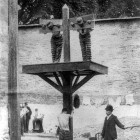
Beginning July 1, Georgia’s juvenile court judges will face a new, unprecedented set of challenges. That’s the first day Georgia will no longer operate under an agreement that allows for the transfer of delinquent juveniles and runaways between the states. Georgia is the only state in the nation that has not already adopted or is not set to adopt the Interstate Compact for Juveniles (ICJ), an update of a previous compact established in 1955. Currently, Georgia functions under the 1955 compact. The Interstate Commission for Juveniles, the governing body of the ICJ, gave Georgia three extensions to pass legislation so the state could enter the new compact (in 2008, 2009 and 2010). Since the Legislature failed to enact the needed legislation in 2011, Georgia will not be given any more extensions, officials at the compact say. The compact provides a framework that allows the seamless transition of juveniles from one state to another. Without the compact, Georgia’s juvenile judges are left “scratching their heads,” Judge Mary Carden, a juvenile judge in the state, said. “Nobody knows what’s going to happen.”
When asked if individual agreements between judges in neighboring states could be worked out, Judge Carden said, “I don’t think that’s realistic.”
“The numbers to deal with are great,” she said. “It will take an inordinate amount of time and effort.”
Judges face enormous workloads, she said. “It’s very difficult for me to get in touch with judges in other courts.”
The Interstate Commission for Juveniles' executive director Ashley Lippert said the commission's attorney has discouraged side deals.









